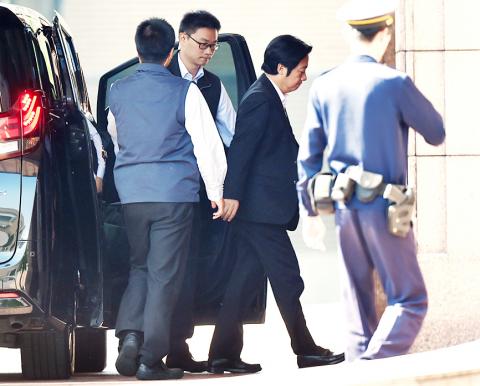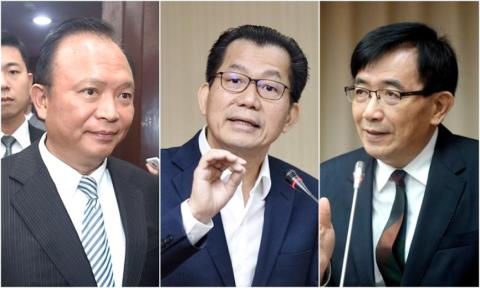Premier William Lai (賴清德) yesterday initiated the first stage of Cabinet reforms after the Democratic Progressive Party’s (DPP) losses in the nine-in-one elections on Nov. 24, approving the resignation of three ministers.
Lai called a Cabinet-level meeting at the Executive Yuan in Taipei to discuss policy reforms, in which he approved resignations tendered by Minister of Transportation and Communications Wu Hong-mo (吳宏謀), Environmental Protection Administration Minister Lee Ying-yuan (李應元) and Council of Agriculture Minister Lin Tsung-hsien (林聰賢).
All ministers were at the meeting except Hakka Affairs Council Minister Lee Yong-te (李永得), who had prior engagements, but had rendered a report on ways to improve his agency prior to the meeting.

Photo: Liao Chen-huei, Taipei Times
After the results of the elections were announced on Sunday last week, Wu, Lee Ying-yuan and Lin had tendered verbal resignations to Lai, and they yesterday again expressed their desire to resign after presenting reports on how to improve their organizations, Executive Yuan spokeswoman Kolas Yotaka told a post-meeting news conference.
They were steadfast in their resolve to resign, as they believed their policies had failed to gain the public’s trust, she said, adding that Lai approved the resignations following the meeting.
From Tuesday, the politically appointed deputy ministers at the three ministries are to take over as acting ministers, Kolas said, adding that the premier would announce their successors in due time.

Taipei Times file photo
Lai did not give any instruction after the three-hour meeting, but was to have all the suggestions made by his Cabinet members organized by last night so that he could process the information and personally report to the public in detail at a future news conference how policy reforms would be carried out, she said.
However, he did offer some remarks regarding the DPP’s election rout, she added.
The DPP did not win people’s trust after it became the ruling party for the second time because it failed to think from the public’s perspective, Kolas quoted Lai as saying.
“We admit that our communication with the public was less than ideal and that we were unable to promptly address public complaints,” Lai was quoted as saying.
“It is the shared opinion of all Cabinet-level agencies that the reforms led by the government should be able to give people hope,” he was quoted as saying. “We must realize that it is the government’s responsibility to lessen people’s burden. We must stand by every family through the hardships in their lives.”
“While we [the government] have our core values, we must take a more humanistic approach backed by more humanistic policy explanations, so that people will understand,” he was quoted as saying.
Several ministers also blamed the DPP’s election losses on the administration’s penchant for touting “cold” figures about its achievements, which failed to win the hearts of people, Kolas said.
Additionally, not only had the government been “virtually defenseless and inert” against the dissemination of disinformation, it had also been inept at using popular social media to communicate with the public in their language, she cited some officials as saying.
Before the meeting ended, Lai, seeing that many ministry officials appeared to be frustrated, encouraged them to keep pushing policies that have won the public’s praise, while remediating the ones that need improvement, Kolas said.

NATIONAL SECURITY THREAT: An official said that Guan Guan’s comments had gone beyond the threshold of free speech, as she advocated for the destruction of the ROC China-born media influencer Guan Guan’s (關關) residency permit has been revoked for repeatedly posting pro-China content that threatens national security, the National Immigration Agency said yesterday. Guan Guan has said many controversial things in her videos posted to Douyin (抖音), including “the red flag will soon be painted all over Taiwan” and “Taiwan is an inseparable part of China,” while expressing hope for expedited “reunification.” The agency received multiple reports alleging that Guan Guan had advocated for armed reunification last year. After investigating, the agency last month issued a notice requiring her to appear and account for her actions. Guan Guan appeared as required,

A strong cold air mass is expected to arrive tonight, bringing a change in weather and a drop in temperature, the Central Weather Administration (CWA) said. The coldest time would be early on Thursday morning, with temperatures in some areas dipping as low as 8°C, it said. Daytime highs yesterday were 22°C to 24°C in northern and eastern Taiwan, and about 25°C to 28°C in the central and southern regions, it said. However, nighttime lows would dip to about 15°C to 16°C in central and northern Taiwan as well as the northeast, and 17°C to 19°C elsewhere, it said. Tropical Storm Nokaen, currently

‘NATO-PLUS’: ‘Our strategic partners in the Indo-Pacific are facing increasing aggression by the Chinese Communist Party,’ US Representative Rob Wittman said The US House of Representatives on Monday released its version of the Consolidated Appropriations Act, which includes US$1.15 billion to support security cooperation with Taiwan. The omnibus act, covering US$1.2 trillion of spending, allocates US$1 billion for the Taiwan Security Cooperation Initiative, as well as US$150 million for the replacement of defense articles and reimbursement of defense services provided to Taiwan. The fund allocations were based on the US National Defense Authorization Act for fiscal 2026 that was passed by the US Congress last month and authorized up to US$1 billion to the US Defense Security Cooperation Agency in support of the

PAPERS, PLEASE: The gang exploited the high value of the passports, selling them at inflated prices to Chinese buyers, who would treat them as ‘invisibility cloaks’ The Yilan District Court has handed four members of a syndicate prison terms ranging from one year and two months to two years and two months for their involvement in a scheme to purchase Taiwanese passports and resell them abroad at a massive markup. A Chinese human smuggling syndicate purchased Taiwanese passports through local criminal networks, exploiting the passports’ visa-free travel privileges to turn a profit of more than 20 times the original price, the court said. Such criminal organizations enable people to impersonate Taiwanese when entering and exiting Taiwan and other countries, undermining social order and the credibility of the nation’s